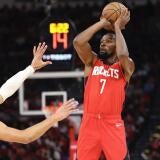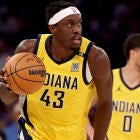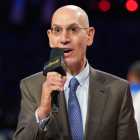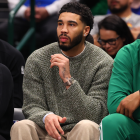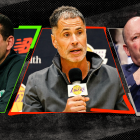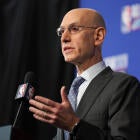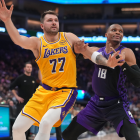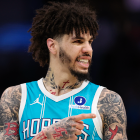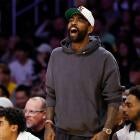
Pacers shot the moon with conference finals run, but 2021 Hawks are a cautionary tale of future expectations
Was Indiana one of the best teams in the Eastern Conference, or a 47-win mirage that caught the right matchups?

As a 47-win No. 6 seed who didn't secure a playoff spot until the last day of the season, the Indiana Pacers shot the moon with an Eastern Conference finals run that ended in a much more competitive series with Boston than the four-game sweep would indicate. Indiana could have, and arguably should have, won two of those games. It played without Tyrese Haliburton in Games 3 and 4 and lost by a grand total of six points.
Tons of reasons for optimism, obviously.
But there's also some cause for, if not necessarily concern, at least some caution as they move forward into this summer and the years to come. They do not want to become the 2021 Atlanta Hawks, who also made a surprise run to the conference finals and, with an emerging superstar point guard at the wheel, seemed primed for even better times ahead.
Unfortunately, time has proven that the Hawks team was something of a mirage. They got hot at the end of the season, which just happened to coincide with the hiring of Nate McMillan. This just happened to line up with the team getting healthy, and a couple of favorable playoff matchups fell into their laps.
First, it was the New York Knicks, who, with a distressed half-court offense almost solely dependent on the individual creation of Julius Randle, were waiting to be exposed as their own kind of fraud, and Trae Young proceeded to take Madison Square Garden by storm. Next it was the Philadelphia 76ers, who were also a flawed team going through the real-time opening act of a Ben Simmons implosion.
Like the Pacers, the Hawks were competitive in the conference finals, where they took two games off the eventual champion Bucks. Had Young not gotten hurt, there was a real chance Atlanta would've won that series, and who knows what would've happened in the Finals against the Suns. That Hawks team, for that run, was legit. They tapped into something they haven't been able to replicate, qualifying for the playoffs just once over the past three years.
Can Indiana avoid that same regression and use this run as a springboard to sustained success? It will be tough because, like the Hawks, they can't really improve the team. They will reportedly offer Pascal Siakam a four-year max contract with a first-year salary north of $42 million. T.J. McConnell's $9.3 million is surely going to be picked up for next season, and he's also extension eligible. The most McConnell can get is $78.7 million over four years, per ESPN's Bobby Marks. I doubt he gets that much, but he's going to get a big bag -- you can bet on that.
With Siakam on a max and McConnell's (non-guaranteed) $9.3 million picked up, the only way Indiana can avoid the luxury tax is to cut bait with restricted free agent Obi Toppin, who made a big impact after coming over from New York last summer. In other words, the Pacers either lose Toppin or they lose access to the non-taxpayer $12.9 million midlevel exception, leaving them with the taxpayer midlevel of $5.2 million. That's not going to net a real needle mover.
All of which is to say, Indiana, with the exception of getting injured Bennedict Mathurin back, is more or less looking at bringing back the same roster. That's what Atlanta did after its surprise run -- banking on internal improvement by locking in McMillan to a four-year deal and inking John Collins to a five-year, $125 million extension it almost immediately regretted. Atlanta's big additions in the summer of 2021? Delon Wright and 36-year-old Lou Williams. Then the Hawks got desperate and traded a king's ransom for Dejounte Murray.
Three years later, McMillan and Collins are gone. The Cam Reddish experiment was a bust. DeAndre Hunter is reportedly on the trade block. Either Young or Murray will likely be gone this summer, if not both of them. It can fall apart quickly, and the Pacers don't even have the luxury of making a trade like the one the Hawks made for Murray. Siakam was that trade. He cost them three first-round picks.
No cap space. Potentially no non-taxpayer MLE. Little to no draft equity. This is what the Pacers have, and I'll remind you again, this is a team that won 47 games and needed help on the final day of the season just to stay out of the play-in tournament. In the Eastern Conference, no less. Which was decimated by injuries in these playoffs.
The Bucks, Knicks, Cavaliers and Heat all played without their best player(s) for multiple games. The Sixers surely would've been a top-six team had Joel Embiid not gone down for so long in the regular season. That alone likely would've pushed the Pacers into the play-in.
Instead, they got to play the Bucks without Giannis Antetokounmpo and, for two of the final three games, Damian Lillard. Then they got the Knicks, who were barely able to put a starting lineup on the floor by the end of that series.
None of this is a knock on the Pacers. These are just facts. Interpret them as you will. I'll say it again: That Hawks team was legit, it just couldn't stay legit. This Pacers team also looks legit. Tyrese Haliburton is an unquestionable star and, for my money, a greater connective force than Young. That alone makes Indiana different.
Beyond that, Siakam is a better No. 2 than Murray was able to be in the shadow of Young. Myles Turner is probably better than Clint Capela at his height and is surely better than Onyeka Okongwu. Maybe Andrew Nembhard really is the next Jalen Brunson. It's unlikely that Indiana will fall off a cliff like Atlanta.
But again, it doesn't need to fall far to be out of the playoffs. The Pacers could have a good season in 2024-25 and be out in the first round easily. The defense got better as this season went on, but only because it started out as awful. Turner is a big-time rim protector but Indiana still allowed more points in the paint than any team in the league; only four teams gave up more second-chance points.
How does that change next season? It probably doesn't. Indiana is in the tough business of outscoring its opponents on a nightly basis, and that's not typically a blueprint for contention -- which, unfortunately and fortunately, however you choose to look at it -- is now the bar the Pacers set for themselves.
Atlanta found out the hard way how expedited timelines encouraged by at least somewhat fluky playoff runs can become the death of what was an exciting young team. I don't expect that to happen to Indiana, but it's nonetheless an applicable cautionary tale both for the organization itself and the fans who are now expecting annual contention. It doesn't always work that way. Outsized expectations are often the root of frustration.
This was a fantastic season for the Pacers, and all of us who enjoy watching this team are hoping this was the start of something. But sometimes, what feels like a beginning is actually an ending. Atlanta was done the second the Milwaukee series ended. If Indiana wants to avoid a similarly regressive fate, it has to find some way, with even fewer roster-improving options than Atlanta enjoyed coming off that 2021 run, to do something different.


